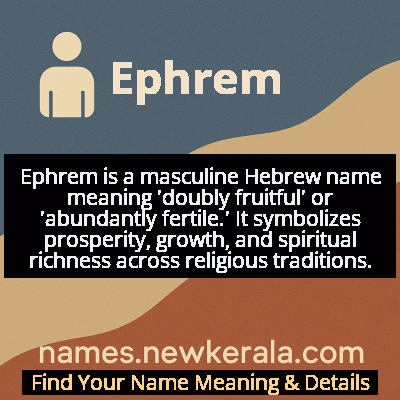Ephrem Name Meaning & Details
Origin, Popularity, Numerology Analysis & Name Meaning of Ephrem
Discover the origin, meaning, and cultural significance of the name EPHREM. Delve into its historical roots and explore the lasting impact it has had on communities and traditions.
Name
Ephrem
Gender
Male
Origin
Hebrew
Lucky Number
2
Meaning of the Name - Ephrem
Ephrem is a masculine Hebrew name meaning 'doubly fruitful' or 'abundantly fertile.' It symbolizes prosperity, growth, and spiritual richness across religious traditions.
Ephrem - Complete Numerology Analysis
Your Numerology Number
Based on Pythagorean Numerology System
Ruling Planet
Moon
Positive Nature
Diplomatic, friendly, artistic, empathetic.
Negative Traits
Over-sensitive, moody, indecisive, prone to self-pity.
Lucky Colours
Green, cream, white.
Lucky Days
Monday.
Lucky Stones
Pearl, moonstone.
Harmony Numbers
1, 3, 4.
Best Suited Professions
Diplomats, mediators, caregivers, artists.
What People Like About You
Cooperative spirit, friendliness, artistic talent.
Famous People Named Ephrem
Saint Ephrem the Syrian
Theologian and Hymnographer
Doctor of the Church, composed influential hymns and biblical commentaries
Ephrem Forni
Diplomat
Italian Cardinal and papal diplomat, served as Apostolic Nuncio to multiple countries
Ephrem K'ani
Religious Leader
Ethiopian Orthodox Archbishop known for theological scholarship and church leadership
Ephrem Engle
Academic
Professor of Philosophy at University of Hawaii, known for work in phenomenology
Name Variations & International Equivalents
Click on blue names to explore their detailed meanings. Gray names with will be available soon.
Cultural & Historical Significance
In Christian tradition, Saint Ephrem the Syrian elevated the name's prominence through his extensive theological writings and hymns that continue to influence Eastern Christian liturgy to this day. The name carries particular weight in Syriac Christianity, where Saint Ephrem is venerated as one of the most important early Church Fathers and hymnographers. His works, written in Syriac, represent a crucial bridge between Semitic and Greek Christian traditions, making the name Ephrem symbolic of cultural and theological synthesis. Throughout history, the name has been particularly cherished in Eastern Orthodox and Oriental Orthodox communities, where it represents both biblical heritage and rich theological tradition.
Extended Personality Analysis
Individuals named Ephrem are often perceived as deeply thoughtful, spiritually inclined, and intellectually curious. The name's biblical origins and association with Saint Ephrem the Syrian suggest a personality characterized by wisdom, poetic sensibility, and strong moral convictions. They tend to be reflective individuals who value tradition while also possessing creative expression—much like their namesake who used poetry and music to convey theological concepts. Ephrems are typically seen as reliable and nurturing, embodying the 'fruitful' aspect of their name's meaning through their ability to foster growth in relationships and projects.
Their strength often lies in quiet perseverance rather than overt ambition, and they frequently demonstrate patience and resilience in facing challenges. Many Ephrems exhibit a natural inclination toward teaching or mentoring roles, sharing knowledge and insights with others. They often balance practical wisdom with spiritual depth, making them valued advisors and confidants in their communities. While sometimes reserved in new situations, they form deep, lasting connections with those who appreciate their thoughtful nature and genuine concern for others' wellbeing. The combination of traditional values and creative thinking often makes Ephrems effective problem-solvers who approach challenges from unique perspectives.
Modern Usage & Popularity
In contemporary times, Ephrem remains a relatively uncommon but respected name, primarily used within religious communities, particularly among Christians of Middle Eastern descent and Catholic families. The name maintains steady but low usage in Western countries, often chosen by parents seeking a biblical name with historical depth that isn't overly common. In the United States, it has never ranked in the top 1000 names, preserving its distinctive quality. Recent years have seen a slight resurgence of interest in traditional biblical names, which may increase Ephrem's visibility. The name is more prevalent in countries with strong Orthodox Christian traditions, including Ethiopia, Syria, and Lebanon, where Saint Ephrem remains an important religious figure. Modern usage often reflects a desire to honor religious heritage while selecting a name that stands out from more popular biblical choices like Jacob or Matthew.
Symbolic & Spiritual Meanings
Symbolically, Ephrem represents fertility, abundance, and spiritual richness beyond mere material prosperity. The 'doubly fruitful' meaning extends metaphorically to intellectual, creative, and spiritual fertility—the ability to produce meaningful work, inspire others, and cultivate inner growth. Like a tree that bears fruit in season, the name suggests cyclical renewal and the fulfillment of potential through patience and proper cultivation. In religious contexts, it symbolizes divine blessing and the multiplication of spiritual gifts. The name also carries connotations of legacy and continuity, representing how ideas, faith, and cultural traditions are passed down and multiplied through generations. It embodies the concept that true abundance comes not from accumulation but from generative capacity—the ability to create, nurture, and sustain life in all its forms, whether through family, art, knowledge, or community building.

